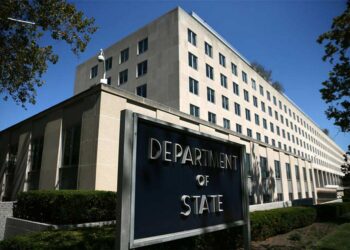Today, the post-Cold War world “order” is in a phase of renewed competition and rivalry between major powers, which is equally felt by medium and small states. Moreover, by sharply increasing their role in the regional and sub-regional format, medium-sized states have turned into “assisting actors” in the renewed confrontation, while small countries are looking at a wide range of ways to pave the way for the external security vector, which offers them a multitude of choices – from balancing to hedging their own interests.
Recalling a few axioms
At first glance, it seems as if the essence and dynamics of the competition and rivalry of modernity are determined mainly by two factors – military and economic – but this is only a momentary and superficial impression. In reality, the basis for the effectiveness and efficiency of both factors is determined by the stability of a country’s political and social system, its acceptance by society, fair participation in it, and equal access to existing opportunities. Otherwise, any military or economic capability, even if it has an effect over a certain period of time, gradually wears out and declines. As a result, the facture of public and social resilience is broken, a significant number of citizens become asocial and indifferent to public and national interests, the system of governance closes in on itself, and thus only accelerates the erosion of trust in it, the thread of solidarity between the state and the citizen is torn, and all this worsens the country’s position in the external arena and leads to the deterioration of its security system.
Numerous examples in today’s world clearly show that the view of international influence by the government or society of a country on the basis of the traditional and classical approach, as a mere compound of external components, is the result of an extremely narrow view and leads to (irreparable) mistakes. Certainly, the danger of external aggression, intervention and interference in the internal life of a country by foreign forces is not debatable, but we believe that harmful and destructive influences emanating from within a country are no less, if not more, dangerous than influences of the same nature from the outside. Moreover, it is endogenous factors – a sense of injustice in society, unequal distribution of public resources, selectivity based on political, social or faith grounds, or any other imbalance or inequality – that can provide fertile ground for the full realization of potential exogenous factors, tenfold and hundredfold increase the effect of virtually any plan or intention directed against the sovereignty and national interests of the country, often – turning the impossible into the possible, turning the irreversible, turning the unthinkable into a tangible given.
So, for us, too, avoiding the stereotype of security in the narrow sense of the word when voicing or making decisions is a necessary starting point for both governors and the governed. As a result, both the concept and the phenomenon are seen only as a combination of external (economic and military ties, diplomacy and behind-the-scenes advocacy, “soft power”) and internal factors (inclusiveness of the political process, social solidarity, equal access to economic opportunities, clear and open resource allocation system), and are collectively transferred to the practical field for the purpose of implementation.
Before turning to the specific issues of practical interest to us, a few key, very brief remarks are appropriate. Each of these leads to a new reality of internal security (and related external security):
(a) The past period of the 21st century has been characterised by a high degree of fragmentation of the democratic process and institutions. This process is likely to continue in the near future;
(b) The sense of social responsibility and the accountability obligation has significantly decreased among the leading actors of the market economy – representatives of the corporate world;
(c) In the process of asset accumulation and growth, the gaps created between different sections of society continue to widen, which is a major source of intense political and social storms;
(d) Taking democratic rights and freedoms “for granted” can be a fatal mistake, since these rights and freedoms do not come and take root on their own. They need constant care, support and nurturing if they are to be maintained and improved. Otherwise, to paraphrase a famous saying, every nation ends up in the environment it deserves…
On the state function of democracy: generalized ‘lessons’ …
Before we focus on this functional purpose, we believe it appropriate to mention a few important “lessons”. It is necessary to talk about them not only for the purpose of theoretical discussion of the issue, but also from a practical point of view: including in order to better see and understand where the development of the Georgian state has “stopped” today, in particular, what the problem is with its political culture, and what has made Georgian society hostage to its own clichés and weaknesses.
Specifically, let’s start with:
(1) Democracy does not create an unconditional counterweight to economic inequality. Thus, relying only on self-regulation and self-governance of the democratic process can lead to a fatal outcome, namely, it can damage the reputation of democracy as a form of governance, facilitate the emergence of populism and radicalism, and, as a result, the creation of suitable conditions for the establishment of autocracy.
Such “evolution” is particularly noteworthy for Georgia and those countries for which poverty remains the main challenge, with the risk of possible autocracy and multiplication of external threats through institutional erosion increasing proportionally.
(2) Particular stress tests for democratic governance are periods of crisis, when speedy decision-making and consolidated execution of decisions made are crucial for security and functional self-sufficiency. In this regard, any inefficiency and delay due to the democratic nature of the process is reflected in serious damage to the reputation of the political system. The recent pandemic is a vivid illustration of this complex and contradictory equation.
(3) To realise security in a broad sense, taking into account the risks of the present and foreseeable future, practically useful are:
(a) Reasonable “etatism” in the current socio-economic processes within the country – emphasizing the constructive and facilitating role of state institutions. This will be useful both for timely prevention of the above-mentioned “evolution”, negative developments (undermining and deterioration of democracy – radicalism and populism – “creeping” autocracy) and for strengthening solidarity between the state and its citizens, which is necessary for national security;
(b) Introduction of elements characteristic of the welfare state in legislation (“smart laws”) and in practice. The prerequisite of social welfare and justice, as well as reasonable “etatism” is crucial for the security of the Georgian state, its competitiveness and its ability to adapt to changing international circumstances;
(c) In a democratic process, a misstep is not irreversible if it is aided in time by the necessary openness, exchange of views, a culture of listening and accepting, by the appropriate use of free debate – so-called “moving” opinion. At the same time, deviating from this approach, trying to turn the country into a “quasi-democracy” or a “semi-free” one, reduces the possibilities of providing aid in times of missteps in the democratic process. And in the end, it again affects the deteriorating international security, the source of which is the viciousness and untrustworthiness of the political process inside the country, the deteriorating internal security itself, both for the political and business elites and for all other segments of society;
(d) Political consensus that accompanies a healthy political process and promotes security from ‘within’. The purpose of consensus is to create a situation in which, in representative institutions – provided they actually function – the will of the majority is duly respected and the discontents of the political minority are properly recognized and “discharged”.
However, in our view, there is a “but” here as well. This is directly related to the requirement of internal political stability and inclusiveness, and thus security. The fact is that democratic majority rule presupposes, first and foremost, a proper decision-making process. In other words, the factor of being in the majority does not equal domination by the power of the majority. Moreover, listening to opposing opinions by the majority, and open debate, respecting the culture of so-called “moving” opinion, gives the majority decision more political legitimacy and moral force in the end. And without such a culture, not only the Georgian political system but also Georgia’s security will always stand on quicksand. The period from the restoration of Georgia’s state independence to the present day is a documented example of this vulnerability;
(e) Placing power in formal structures, introducing the necessary mechanisms to prevent the “spillover” of power from these structures, and the proper distribution of power between the structures. In other words, we consider one of the determinants of a healthy state within a state-constitutional system with real power to be the democracy of decision-making within the same system – a kind of “democracy from within”. However, it should be noted that, given the “moving” opinion, open reasoning and competence, not only the authorities of Georgia (in the sense of formal and influential groups), but also political parties, civil society and the media suffer from an acute lack of “internal democracy”. Thus, without the necessary practical characteristics for a proper political and creative process, the listed actors inadvertently create a risk to the necessary balance within the country, reject each other and a large part of society and, as a result, create a threat to stability and security.
… And Georgian “lessons”
A number of systems – mainly in Western countries – have achieved rapid development, including through deregulation. However, the complete delegation of responsibility for the laws of the market economy has also led to the systemic challenges we are seeing now. We have already talked about this topic in detail many times and will talk about it another time as well, its unfolding is beyond the scope of this article. This time we would like to convey the main idea of the Georgian case.
In particular, based on the goal of resilience and security of our country, a complete emphasis on military and political ties or alliances alone is correct but insufficient. Stability and external risk management based on predictability and internal security are largely based on an understandable and acceptable agreement between the state and citizens on political and business processes in the internal life of the country.
The following conditions should be ensured for the viability and reliability of this agreement – both in writing and in operation – as well as for the sense of citizenship of one’s country:
(a) Social capital of institutions and institutional governance, i.e. trust in them;
(b) Equal access to economic resources and opportunities;
(c) Striking the right balance between capital on the one hand and the development of the state and society on the other; The advancement of capital is the most important prerequisite for a rich and self-sufficient country, although it is in the interest of capital itself to make consistent, systematic and inclusive progress on a national scale;
(d) The provision of quality services by the state;
(e) The realisation of real rather than illusory meritocracy in politics and governance;
(f) The existence of at least several political and business centres competing within a framework of law and publicity which prevents the “capture” of all power by one particular group or individual;
(g) The availability and use of information and other technologies for the inclusive development of the country as an “obstacle” to retreat.
We consider the implementation of these and other possible conditions in real life, their establishment as a rule and their transmission from generation to generation as a state, political and social heritage, as a practical mechanism for strengthening internal Georgian, and thus national security to a greater or lesser extent.
In addition to the above, the combination of these conditions contributes to the already mentioned “democratization from within” of a process and to a better awareness of different actors, which also creates an opportunity for a more orderly and consistent defense of national stability and national and state interests in the external arena – without internal fluctuations, radical polarization and crossing of “red lines”.
Otherwise, the national security system will be so saturated with vulnerable areas that the aggravation of the problem of even one of them may be contagious to the rest and lead to the disintegration of the entire system, which will diminish the country’s sovereignty and increase harmful influences from outside and within, moreover: at such times, there is an illusory notion that concentration of power is better, especially for effectively overcoming external and internal challenges. In fact, the opposite consequence of this notion is the slide of the concentration of power towards authoritarianism and the dangerous transformation of the country into a so-called “besieged fortress”, which further multiplies and aggravates the risks of national security. For such a situation, we do not have enough resources for self-sufficiency and, most importantly, we do not have the will determined by our own historical past and present.
It has been said and written about many times…
… that security in the modern sense is more than armor and bullets. From the point of view of the present and future of the Georgian state, a correct and acceptable balance between the institutions of the state and the citizens is also necessary. Only on such balancing of relations, mutual control and mutual participation does the load-bearing wall of our own security and competitive development hold. It is also a practical way to manage today’s risks and minimize future threats where possible. Now is the time to be bolder in taking more responsibility.
Blog by Victor Kipiani, Geocase Chairman














